【备战2014,教师原创】2014年高考英语语法备考 状语从句 课件
文档属性
| 名称 | 【备战2014,教师原创】2014年高考英语语法备考 状语从句 课件 |

|
|
| 格式 | zip | ||
| 文件大小 | 1.9MB | ||
| 资源类型 | 教案 | ||
| 版本资源 | |||
| 科目 | 英语 | ||
| 更新时间 | 2014-03-24 00:00:00 | ||
图片预览

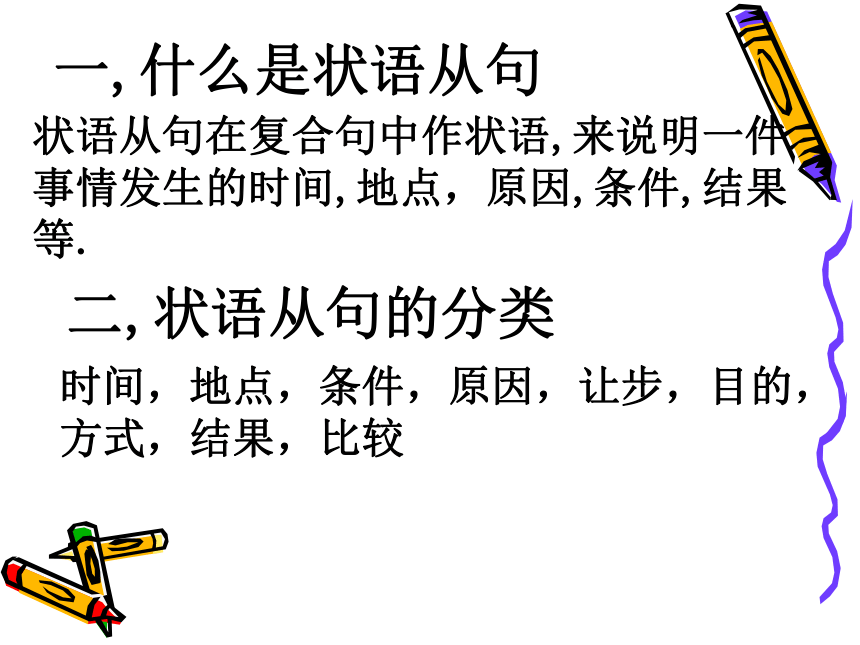

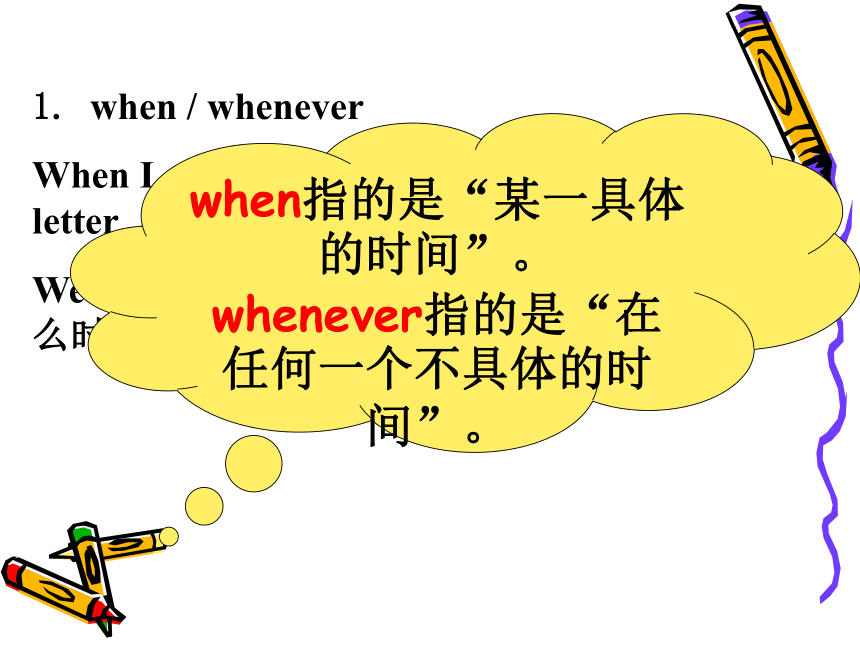
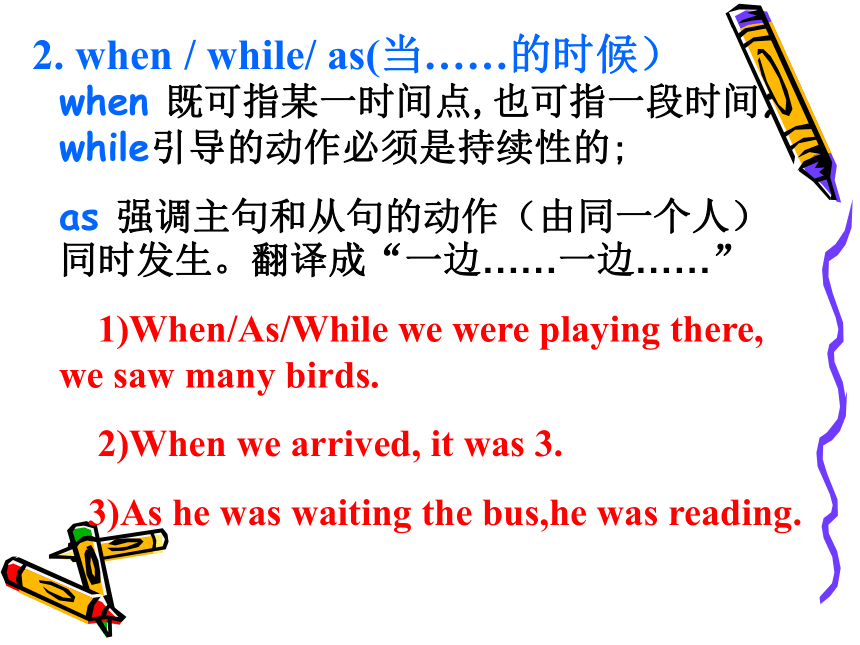
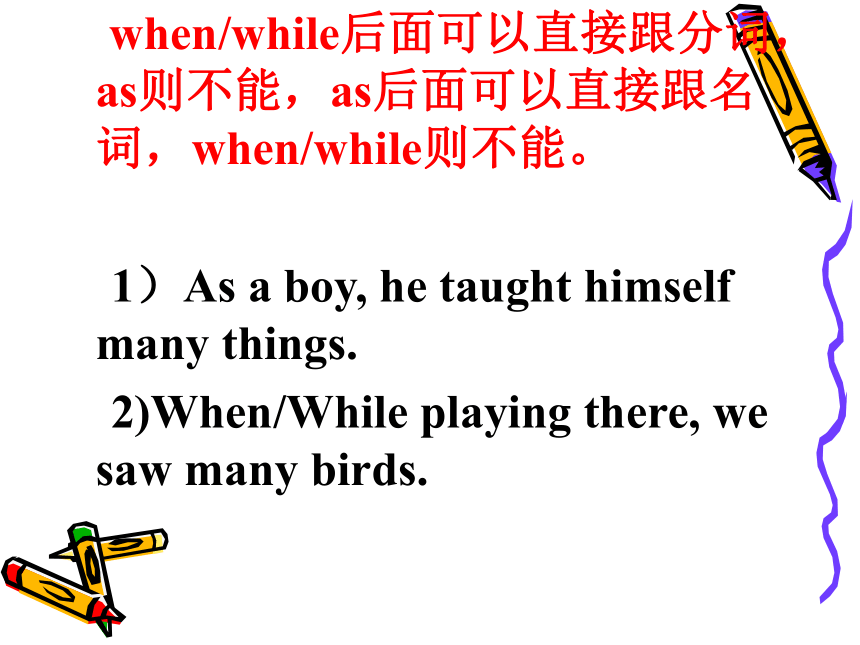
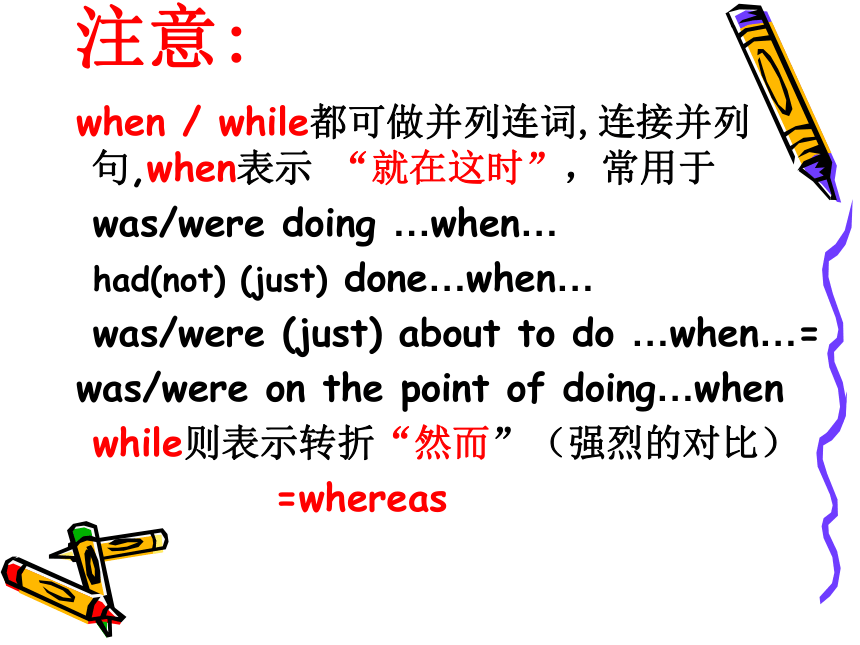
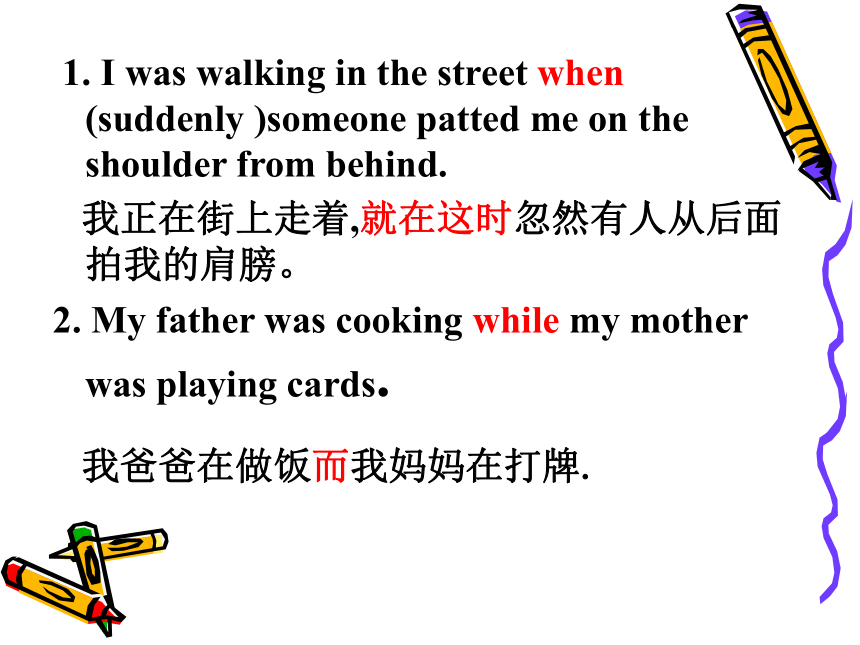
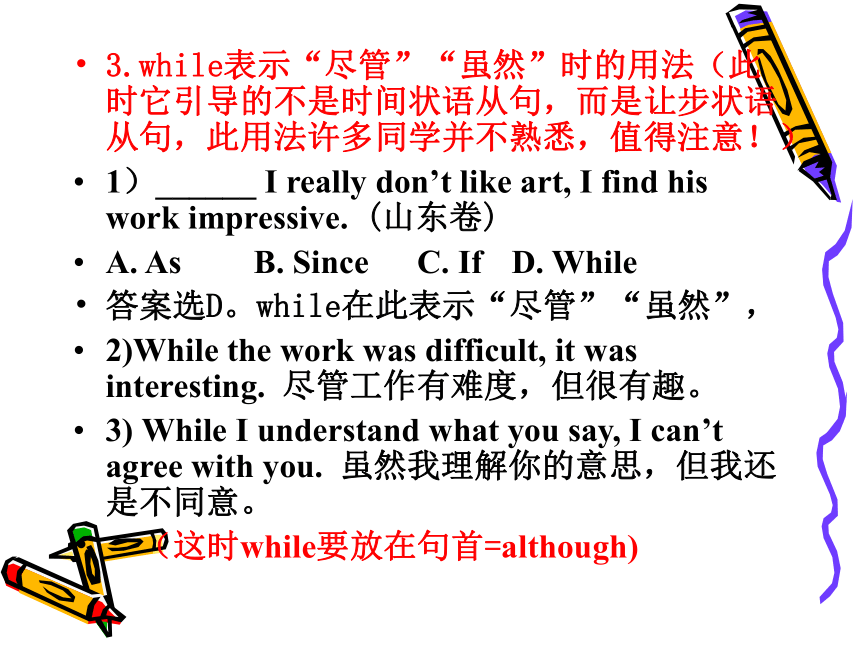
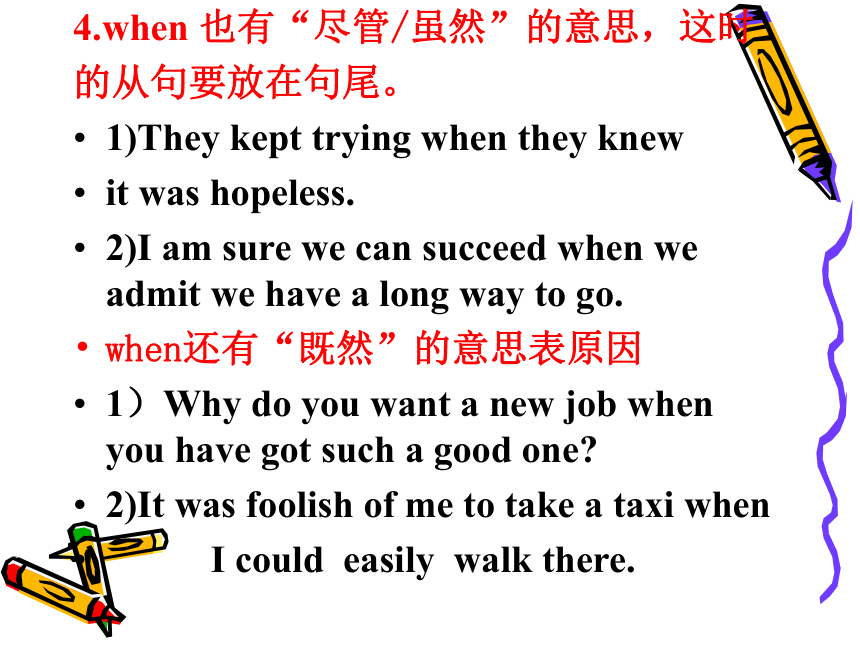
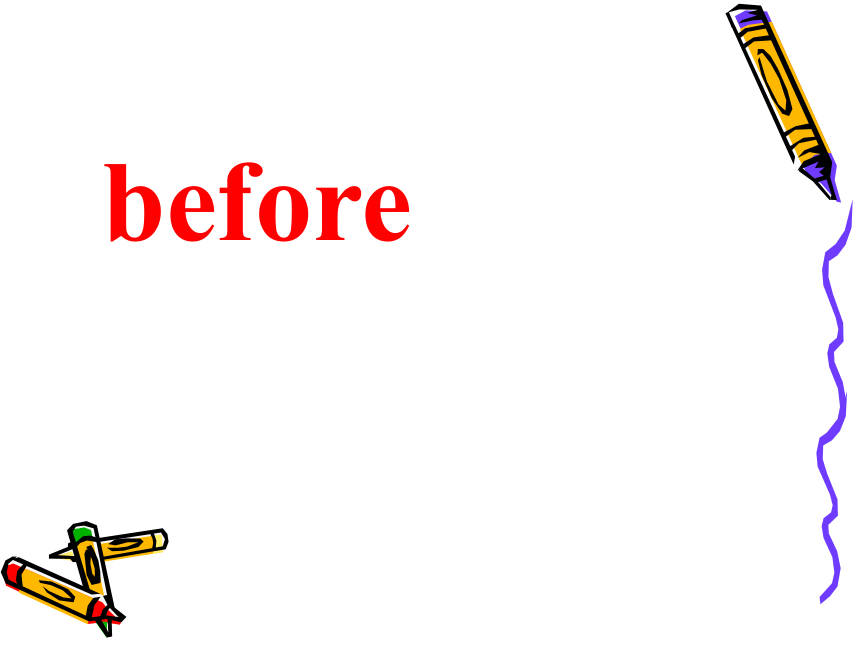
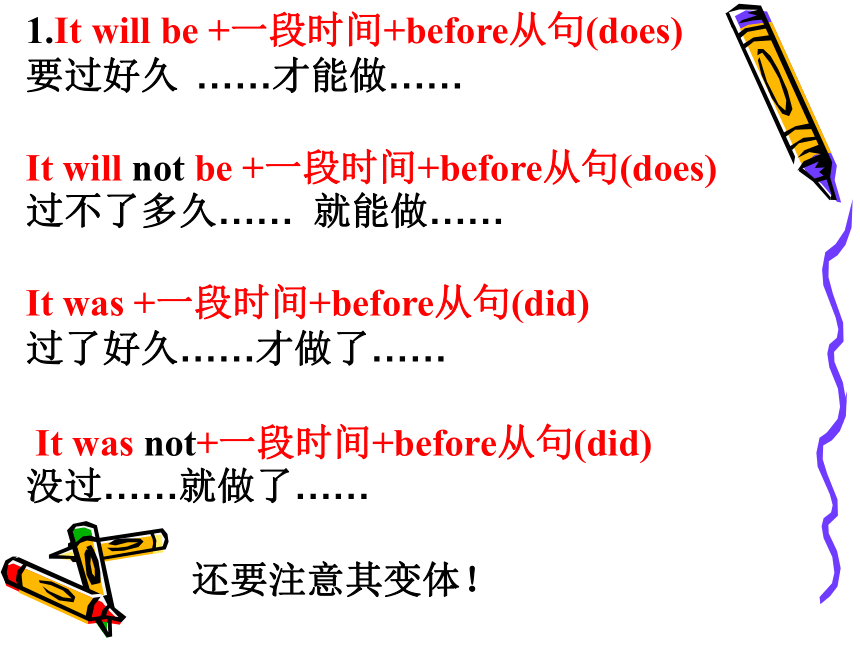
文档简介
课件53张PPT。状语从句一,什么是状语从句状语从句在复合句中作状语,来说明一件事情发生的时间,地点,原因,条件,结果等.二,状语从句的分类时间,地点,条件,原因,让步,目的,方式,结果,比较
时间状语从句1. when / whenever
When I came into the room, he was writing a letter.当我进屋时,他正在写信。
We shall go there whenever we are free.我们什么时间有空,我们就去那里。
when指的是“某一具体的时间”。
whenever指的是“在任何一个不具体的时间”。2. when / while/ as(当……的时候)when 既可指某一时间点,也可指一段时间; while引导的动作必须是持续性的;
as 强调主句和从句的动作(由同一个人)同时发生。翻译成“一边……一边……”
1)When/As/While we were playing there, we saw many birds.
2)When we arrived, it was 3.
3)As he was waiting the bus,he was reading. when/while后面可以直接跟分词,as则不能,as后面可以直接跟名词,when/while则不能。
1)As a boy, he taught himself many things.
2)When/While playing there, we saw many birds. 注意: when / while都可做并列连词,连接并列句,when表示 “就在这时”,常用于
was/were doing …when…
had(not) (just) done…when…
was/were (just) about to do …when…=
was/were on the point of doing…when
while则表示转折“然而”(强烈的对比)
=whereas
1. I was walking in the street when (suddenly )someone patted me on the shoulder from behind.
我正在街上走着,就在这时忽然有人从后面拍我的肩膀。
2. My father was cooking while my mother was playing cards.
我爸爸在做饭而我妈妈在打牌.
3.while表示“尽管”“虽然”时的用法(此时它引导的不是时间状语从句,而是让步状语从句,此用法许多同学并不熟悉,值得注意!)
1)______ I really don’t like art, I find his work impressive. (山东卷)
A. As? B. Since? C. If? D. While
答案选D。while在此表示“尽管”“虽然”,
2)While the work was difficult, it was interesting. 尽管工作有难度,但很有趣。
3) While I understand what you say, I can’t agree with you. 虽然我理解你的意思,但我还是不同意。
(这时while要放在句首=although)4.when 也有“尽管/虽然”的意思,这时
的从句要放在句尾。
1)They kept trying when they knew
it was hopeless.
2)I am sure we can succeed when we admit we have a long way to go.
when还有“既然”的意思表原因
1)Why do you want a new job when you have got such a good one?
2)It was foolish of me to take a taxi when
I could easily walk there.
before
1.It will be +一段时间+before从句(does) 要过好久 ……才能做……
It will not be +一段时间+before从句(does) 过不了多久…… 就能做……
It was +一段时间+before从句(did)
过了好久……才做了……
It was not+一段时间+before从句(did) 没过……就做了……
还要注意其变体!2.before I could do,…(还没来得及…就…)
Before I could get in a word, the tailor had measured me.
3.before sb does,…(趁还没做……,……)
Please write it down before you forget it
4.hadn’t done …before sb did 还没…..就……
We hadn’t run a mile before we felt tired.
我们还没跑到一里路就觉得累了。
5.had done …before sb did…做了……才……
We had sailed four days before we saw
land.(我们航行了四天才看见陆地)
6.before sb knew/realised it.
不知不觉地
一......就......1.as soon as
主从句的谓语动词有两种情况:主从句都用一般过去时、主句用一般将来时,从句用一般现在时
1)As soon as he arrived there, he wrote to me.
2)As soon as he arrives there ,he will write to me.
2.the + 时间名词
the moment/minute/instant/day/year…
+句子
3.immediately/directly/instantly+句子
4.at+名词
At the news,we were moved into tears.
5,on/upon+doing/含动作意味的名词
on(one’s) arriving /on(one’s) arrival
on entering/on entrance
on returning/on return
6,hardly/scarcely…when…/no sooner…than…
7,every time,each time,last time,next time,the first time
since
It is/ has been +一段时间+since 从句(did)It is 10 years since I smoked.(=I gave up smoking/dropped smoking)
自从我不抽烟已有10年了.延续性动词:反过来翻译短暂性动词:直译
not...until...till /until(在句首、与not无间隔连用及在强调句中只用until)
We waited till (until) he came back .我们一直等到他回来。
She didn’t stop working until eleven o’clock .她到11点钟才停止工作。
如主句动词是延续性动作,常用肯定式,表示“直到…为止”;如主句动词是瞬间动词,常用否定式,表示“直到…才”not… until …句型考点:与强调句型结合
I didn’t go to sleep until he came back.
与倒装句型结合It was not until he came back that I
went to sleep.Not until he came back did I
go to sleep.
原因状语从句because / sincebecause表示直接的原因,具有很强的因果关系,专门回答对 “why”的提问; since=now that, 翻译成“既然”,通常放句首;1) eg: It was because his mother was badly ill that he was unhappy.
2)Since everyone knows it, I will not say anything.for 不是从属连词,而是并列连词。它不是用来说明原因,而是用来表示一种附带或补充解释、说明,不放在句首.The day breaks, for the birds are singing. as 表示很明显的双方都知道的原因
eg. As it is getting colder and colder,
we had better wear more.now that, seeing thatseeing (that),now that和since, as 意义相似,他们都有“鉴于某个事实”的意思,that可以省去。eg. Now (that) the weather has cleared up,
we can start our journey.一些固定短语:
on account of
because of
due to
thanks to
owing to
in that
not that…but that…
as a result/consequence
条件状语从句 1,连词:
if,unless,as/so long as,on condition that,
if only,only if,given,assuming,
suppose/supposing
providing/provided 2, 注意点:分清真实条件句和非真实条件句,非真实条件句中要用虚拟语气
目的状语从句 1.so that/ in order that
从句中常用情态动词may (might)/ can (could) /should
当从句中的谓语与主句中的谓语一致时,
in order that+句子可以换成 in order to+do,
so that+句子可以换成so as to +do
eg.I sit in the front in order that/so that I can hear the teachers clearly.
I sit in the front in order to/so as to hear the teachers clearly.
下面这句可以象这样换吗?
I raised my voice so that everyone
could hear me.
I raised my voice so as to be heard.2. that
3.lest (以免/免得 /唯恐)
4.in case/for fear that
??作“以防”来讲, in case 相当于 for fear that,??并可以通用(陈述语气、虚拟语气均可)。
1)??I wrote it down in case/ for fear that I should forget it.
我把它抄下,免得忘记。
2) I must stay at home this morning in case/for fear that he comes to see me.
我今天上午必须呆在家里,恐怕他会来看我。 for fear of/that 表示“由于害怕/惟恐/以免”,of后多半接名词,that后接从句用虚拟语气
1)Put on a coat for fear of catching a cold.
穿上外衣以免感冒。
2)The weather is so changable that people always bring their umbrella with them for fear of rain.
天气多变,人们总是要随身带着雨伞以防下雨。
3)We kept quiet for fear that we might disturb others. 他让我们保持安静,以免打扰别人。
in case of 假使,万一,后面只能跟名词 1)In case of fire, ring the bell.万一起火,请按铃。
两者的区别: 2)In case of rain ,they won‘t go .万一下雨,他们就 不去了。 3)Take an umbrella with you for fear of rain .
带上一把伞,以免下雨。
in case 指“假如某情况出现,我们要…”for fear指“我们要……以免某种情况出现”,不过,两者的区别好像不是很明显。
更多的例句in case of?(+n.)??以防 ,假如,如果发生 1)In case of emergency, break the glass and press the button. 遇到紧急情况时,击碎玻璃罩并摁下按钮。 2)In case of fire, ring the alarm bell. 如遇失火,请按警铃。 3)In case of flood, the dam can protect us. 在发洪水的时候, 大堤可以保护我们。 4)In case of rain, they can‘t go. 万一下雨,他们就不能去了。 5)I have kept a reserve fund in case of accidents. 我已筹备了一笔准备基金以防不测。 for fear of (+doing) 唯恐
1)The teacher refused to have his daughter in his class, for fear of showing favour to her.
教师不愿意把自己的女儿编入自己的班 级,恐怕会对她有所偏袒。
2)He left a hour early for fear of missing the train. 他提早一小时离开,惟恐错过那次火车。
3)We spoke in whispers for fear of waking the baby/for fear (that) we might wake the baby. 我们轻声谈话, 以免吵醒婴儿.
4)The nurse walked on tiptoe for fear of waking the patient. 护士踮着脚走惟恐会吵醒病人。
结果状语从句
so that/so…that/such…that
1)I raised my voice, so that everyone
heard me.
2)He was so excited that he couldn’t
say a word.
3)She told us such an interesting story
that we all forgot the time.
so+adj./adv., such(a/an)+n.或者adj.+n
当主从句主语一致时我们可以怎样改写由so…that…/such…that…引导的句子?
方式状语从句1)Draw a cat as I taught you .
按照我教你的画一只猫。
2)Do as you are told.
按照人家告诉你做的去做。as,按照或正如3)They treat the black boy as if (though) he were an animal.
他们对待这黑孩子仿佛他是一头牲口。as if/as though好象,似乎 as if/though 如果从句中陈述的情况很可能是真的也可以用陈述语序。
I feel as if I have a fever.
as if /though 后面还可以直接跟什么?
adj.,prep-,doing,to do
让步状语从句1.though/although
不能与but连用, 但可与yet或still连用
eg.Although (Though) he was over sixty,
(yet/still) he began to learn French.
2.even if/even though
“即使,纵使”有退一步设想的意味,多用于书面语中。
eg. I will go even if /though it rains tomorrow.
3.no matter +疑问词 /疑问词-ever
1)Do it no matter what others say.
2)No matter how busy he was, he studied English every day.
4.as 倒装句
1)Child as he is(=Though he is a child) , he knows a lot .
尽管他是一个孩子,但他懂得很多。
2)Cold as it is, (= Though it is cold,) the children play outdoors.
尽管天气冷,但孩子们仍在户外玩。
as引出的状语从句常放在句首,语序必须部分倒装。常将什么提前?主要考点又是哪些?4. much as(尽管,即使)
eg.Much as I would like to help you ,I’m afraid I’m simply too busy at that moment.
5.由介词或介词短语引导
with all/for all(虽然,尽管),with,
in spite of, despite, regardless of,
disregarding(不管/不顾)the fact that…
地点状语从句where
在……的地方
到……的地方
……的地方
1)Where there is a will,there is a way.
2)Where there is life ,there is hope.
While there is life ,there is hope
3)We must go where we are most needed.
4)That is where you are wrong.
比较状语从句
1.as… as
2.not as/so …as
3.than
4.senior,junior,infeiror,superior
5.否定词+比较级
6.no+-er+than
7.the –er…,the –er…
8.倍数表达法:
1) My shoes are three times bigger than yours.
2) My shoes are three times as big as yours.
3) My shoes are three times the size of yours.
4) The size of my shoes is three times that of yours.注意:
1.状语从句的省略:
当从句的主语和主句的主语一致时,通 常省去从句的主语和位于中的be
2.状语从句中要用一般现在时代替一般将来时(if 有例外)
3.although…but…,because…so…不能连用
再见
时间状语从句1. when / whenever
When I came into the room, he was writing a letter.当我进屋时,他正在写信。
We shall go there whenever we are free.我们什么时间有空,我们就去那里。
when指的是“某一具体的时间”。
whenever指的是“在任何一个不具体的时间”。2. when / while/ as(当……的时候)when 既可指某一时间点,也可指一段时间; while引导的动作必须是持续性的;
as 强调主句和从句的动作(由同一个人)同时发生。翻译成“一边……一边……”
1)When/As/While we were playing there, we saw many birds.
2)When we arrived, it was 3.
3)As he was waiting the bus,he was reading. when/while后面可以直接跟分词,as则不能,as后面可以直接跟名词,when/while则不能。
1)As a boy, he taught himself many things.
2)When/While playing there, we saw many birds. 注意: when / while都可做并列连词,连接并列句,when表示 “就在这时”,常用于
was/were doing …when…
had(not) (just) done…when…
was/were (just) about to do …when…=
was/were on the point of doing…when
while则表示转折“然而”(强烈的对比)
=whereas
1. I was walking in the street when (suddenly )someone patted me on the shoulder from behind.
我正在街上走着,就在这时忽然有人从后面拍我的肩膀。
2. My father was cooking while my mother was playing cards.
我爸爸在做饭而我妈妈在打牌.
3.while表示“尽管”“虽然”时的用法(此时它引导的不是时间状语从句,而是让步状语从句,此用法许多同学并不熟悉,值得注意!)
1)______ I really don’t like art, I find his work impressive. (山东卷)
A. As? B. Since? C. If? D. While
答案选D。while在此表示“尽管”“虽然”,
2)While the work was difficult, it was interesting. 尽管工作有难度,但很有趣。
3) While I understand what you say, I can’t agree with you. 虽然我理解你的意思,但我还是不同意。
(这时while要放在句首=although)4.when 也有“尽管/虽然”的意思,这时
的从句要放在句尾。
1)They kept trying when they knew
it was hopeless.
2)I am sure we can succeed when we admit we have a long way to go.
when还有“既然”的意思表原因
1)Why do you want a new job when you have got such a good one?
2)It was foolish of me to take a taxi when
I could easily walk there.
before
1.It will be +一段时间+before从句(does) 要过好久 ……才能做……
It will not be +一段时间+before从句(does) 过不了多久…… 就能做……
It was +一段时间+before从句(did)
过了好久……才做了……
It was not+一段时间+before从句(did) 没过……就做了……
还要注意其变体!2.before I could do,…(还没来得及…就…)
Before I could get in a word, the tailor had measured me.
3.before sb does,…(趁还没做……,……)
Please write it down before you forget it
4.hadn’t done …before sb did 还没…..就……
We hadn’t run a mile before we felt tired.
我们还没跑到一里路就觉得累了。
5.had done …before sb did…做了……才……
We had sailed four days before we saw
land.(我们航行了四天才看见陆地)
6.before sb knew/realised it.
不知不觉地
一......就......1.as soon as
主从句的谓语动词有两种情况:主从句都用一般过去时、主句用一般将来时,从句用一般现在时
1)As soon as he arrived there, he wrote to me.
2)As soon as he arrives there ,he will write to me.
2.the + 时间名词
the moment/minute/instant/day/year…
+句子
3.immediately/directly/instantly+句子
4.at+名词
At the news,we were moved into tears.
5,on/upon+doing/含动作意味的名词
on(one’s) arriving /on(one’s) arrival
on entering/on entrance
on returning/on return
6,hardly/scarcely…when…/no sooner…than…
7,every time,each time,last time,next time,the first time
since
It is/ has been +一段时间+since 从句(did)It is 10 years since I smoked.(=I gave up smoking/dropped smoking)
自从我不抽烟已有10年了.延续性动词:反过来翻译短暂性动词:直译
not...until...till /until(在句首、与not无间隔连用及在强调句中只用until)
We waited till (until) he came back .我们一直等到他回来。
She didn’t stop working until eleven o’clock .她到11点钟才停止工作。
如主句动词是延续性动作,常用肯定式,表示“直到…为止”;如主句动词是瞬间动词,常用否定式,表示“直到…才”not… until …句型考点:与强调句型结合
I didn’t go to sleep until he came back.
与倒装句型结合It was not until he came back that I
went to sleep.Not until he came back did I
go to sleep.
原因状语从句because / sincebecause表示直接的原因,具有很强的因果关系,专门回答对 “why”的提问; since=now that, 翻译成“既然”,通常放句首;1) eg: It was because his mother was badly ill that he was unhappy.
2)Since everyone knows it, I will not say anything.for 不是从属连词,而是并列连词。它不是用来说明原因,而是用来表示一种附带或补充解释、说明,不放在句首.The day breaks, for the birds are singing. as 表示很明显的双方都知道的原因
eg. As it is getting colder and colder,
we had better wear more.now that, seeing thatseeing (that),now that和since, as 意义相似,他们都有“鉴于某个事实”的意思,that可以省去。eg. Now (that) the weather has cleared up,
we can start our journey.一些固定短语:
on account of
because of
due to
thanks to
owing to
in that
not that…but that…
as a result/consequence
条件状语从句 1,连词:
if,unless,as/so long as,on condition that,
if only,only if,given,assuming,
suppose/supposing
providing/provided 2, 注意点:分清真实条件句和非真实条件句,非真实条件句中要用虚拟语气
目的状语从句 1.so that/ in order that
从句中常用情态动词may (might)/ can (could) /should
当从句中的谓语与主句中的谓语一致时,
in order that+句子可以换成 in order to+do,
so that+句子可以换成so as to +do
eg.I sit in the front in order that/so that I can hear the teachers clearly.
I sit in the front in order to/so as to hear the teachers clearly.
下面这句可以象这样换吗?
I raised my voice so that everyone
could hear me.
I raised my voice so as to be heard.2. that
3.lest (以免/免得 /唯恐)
4.in case/for fear that
??作“以防”来讲, in case 相当于 for fear that,??并可以通用(陈述语气、虚拟语气均可)。
1)??I wrote it down in case/ for fear that I should forget it.
我把它抄下,免得忘记。
2) I must stay at home this morning in case/for fear that he comes to see me.
我今天上午必须呆在家里,恐怕他会来看我。 for fear of/that 表示“由于害怕/惟恐/以免”,of后多半接名词,that后接从句用虚拟语气
1)Put on a coat for fear of catching a cold.
穿上外衣以免感冒。
2)The weather is so changable that people always bring their umbrella with them for fear of rain.
天气多变,人们总是要随身带着雨伞以防下雨。
3)We kept quiet for fear that we might disturb others. 他让我们保持安静,以免打扰别人。
in case of 假使,万一,后面只能跟名词 1)In case of fire, ring the bell.万一起火,请按铃。
两者的区别: 2)In case of rain ,they won‘t go .万一下雨,他们就 不去了。 3)Take an umbrella with you for fear of rain .
带上一把伞,以免下雨。
in case 指“假如某情况出现,我们要…”for fear指“我们要……以免某种情况出现”,不过,两者的区别好像不是很明显。
更多的例句in case of?(+n.)??以防 ,假如,如果发生 1)In case of emergency, break the glass and press the button. 遇到紧急情况时,击碎玻璃罩并摁下按钮。 2)In case of fire, ring the alarm bell. 如遇失火,请按警铃。 3)In case of flood, the dam can protect us. 在发洪水的时候, 大堤可以保护我们。 4)In case of rain, they can‘t go. 万一下雨,他们就不能去了。 5)I have kept a reserve fund in case of accidents. 我已筹备了一笔准备基金以防不测。 for fear of (+doing) 唯恐
1)The teacher refused to have his daughter in his class, for fear of showing favour to her.
教师不愿意把自己的女儿编入自己的班 级,恐怕会对她有所偏袒。
2)He left a hour early for fear of missing the train. 他提早一小时离开,惟恐错过那次火车。
3)We spoke in whispers for fear of waking the baby/for fear (that) we might wake the baby. 我们轻声谈话, 以免吵醒婴儿.
4)The nurse walked on tiptoe for fear of waking the patient. 护士踮着脚走惟恐会吵醒病人。
结果状语从句
so that/so…that/such…that
1)I raised my voice, so that everyone
heard me.
2)He was so excited that he couldn’t
say a word.
3)She told us such an interesting story
that we all forgot the time.
so+adj./adv., such(a/an)+n.或者adj.+n
当主从句主语一致时我们可以怎样改写由so…that…/such…that…引导的句子?
方式状语从句1)Draw a cat as I taught you .
按照我教你的画一只猫。
2)Do as you are told.
按照人家告诉你做的去做。as,按照或正如3)They treat the black boy as if (though) he were an animal.
他们对待这黑孩子仿佛他是一头牲口。as if/as though好象,似乎 as if/though 如果从句中陈述的情况很可能是真的也可以用陈述语序。
I feel as if I have a fever.
as if /though 后面还可以直接跟什么?
adj.,prep-,doing,to do
让步状语从句1.though/although
不能与but连用, 但可与yet或still连用
eg.Although (Though) he was over sixty,
(yet/still) he began to learn French.
2.even if/even though
“即使,纵使”有退一步设想的意味,多用于书面语中。
eg. I will go even if /though it rains tomorrow.
3.no matter +疑问词 /疑问词-ever
1)Do it no matter what others say.
2)No matter how busy he was, he studied English every day.
4.as 倒装句
1)Child as he is(=Though he is a child) , he knows a lot .
尽管他是一个孩子,但他懂得很多。
2)Cold as it is, (= Though it is cold,) the children play outdoors.
尽管天气冷,但孩子们仍在户外玩。
as引出的状语从句常放在句首,语序必须部分倒装。常将什么提前?主要考点又是哪些?4. much as(尽管,即使)
eg.Much as I would like to help you ,I’m afraid I’m simply too busy at that moment.
5.由介词或介词短语引导
with all/for all(虽然,尽管),with,
in spite of, despite, regardless of,
disregarding(不管/不顾)the fact that…
地点状语从句where
在……的地方
到……的地方
……的地方
1)Where there is a will,there is a way.
2)Where there is life ,there is hope.
While there is life ,there is hope
3)We must go where we are most needed.
4)That is where you are wrong.
比较状语从句
1.as… as
2.not as/so …as
3.than
4.senior,junior,infeiror,superior
5.否定词+比较级
6.no+-er+than
7.the –er…,the –er…
8.倍数表达法:
1) My shoes are three times bigger than yours.
2) My shoes are three times as big as yours.
3) My shoes are three times the size of yours.
4) The size of my shoes is three times that of yours.注意:
1.状语从句的省略:
当从句的主语和主句的主语一致时,通 常省去从句的主语和位于中的be
2.状语从句中要用一般现在时代替一般将来时(if 有例外)
3.although…but…,because…so…不能连用
再见
